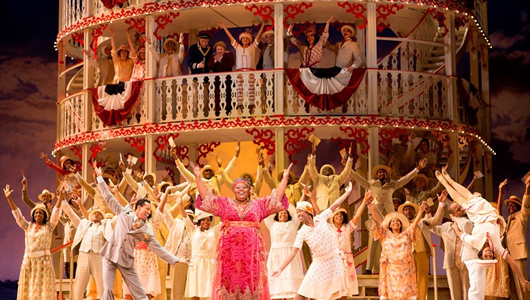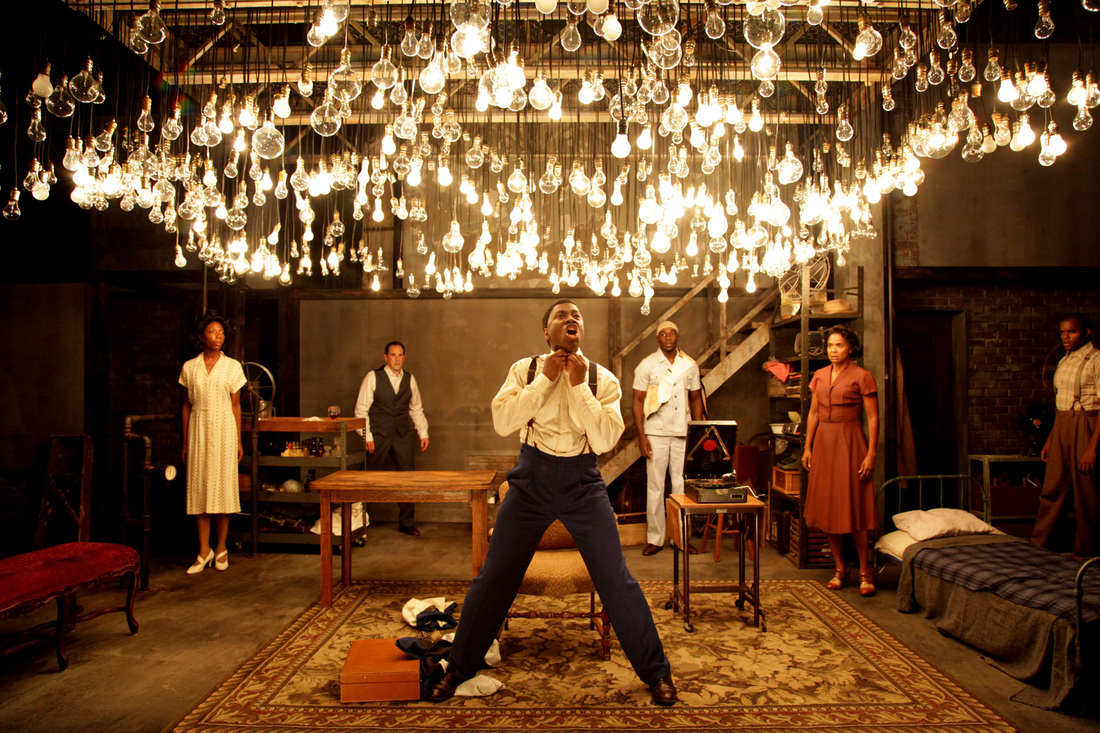|
JACQUELINE LAWTON: Why did you decide to get into theatre? Was there someone or a particular show that inspired you?
JENNIFER PERRY: I didn’t get to see many shows as a child growing up in Upstate New York even though I loved Broadway musicals ever since hearing the songs from “Annie” (cliché, I know). I got into theatre – listening to cast recordings and participating in a school chorus that sang a lot of showtunes – as a means of escape from my usual life. I was a very serious kid who did well academically and it was always nice to have a breather from that world every so often. Today the same thing holds true even if my love for theatre has extended beyond splashy Broadway musicals. After college I pursued a career in government/international affairs. Theatre still is my escape from my politics-centric life whether seeing many of the latest shows in New York or nearly everything here in DC. JL: How long have you lived and worked as a theatre critic in D.C.? What brought you here? Why have you stayed? JP: I moved to DC a few months after I finished college in 2001 to attend grad school at American University’s School of International Service. I stay in DC because although I love the city more than any other place in this country, it’s also where I need to be for my career. I’m thankful it also has a fabulous theatre scene because I don’t think I could survive very well in an American city that didn’t have that (if I were overseas, it would be an entirely different situation). Even before assuming a critics position, I still saw almost everything in town. My theatre critic position in DC didn’t start until about two years ago when my husband Elliot Lanes, who works in the theatre, talked to Joel Markowitz about writing for him. I always loved to write – and people told me I was talented in that area – so I decided to fuse my two interests and take up writing for Maryland Theatre Guide and later DC Metro Theater Arts. Now, I write for BroadwayWorld and DC Theatre Scene. JL: How do you define the work you do? Specifically, what is the role of the theatre critic in the world of theatre? What contribution do you hope to make in the D.C. Theatre community and the American Theatre? JP: I think the role of a theatre critic is to promote awareness of and enthusiasm for the art form to be sure, but to also provide honest reactions to each production we see. It’s not always easy to balance the two elements, but my hope is that I contribute reviews that do just that. In terms of providing reactions to production, the idea is not simply write to influence the ticket buying habits of the public, but to provide an informed and insightful outsider perspective on the outcome of a particular creative endeavor. To this end, our critiques can and should contribute to the institutional memory of a show (particularly world premieres and less-produced works). They also might inform the actors, directors and playwrights and others of things that might have worked and might not have worked as they continue to not only pursue excellence in that particular production, but pursue their craft more generally. Our thoughts are of course subjective, but I would hope they’d be examined in one way or another. If deemed valid, they might inform the creative process. JL: If your work as a theatre critic doesn’t pay the bills, what else do you do? How do you balance this work with your play viewing and criticism? JP: Even though seeing/critiquing shows eats up a huge portion of my time and I take it seriously, it’s most definitely not what I call my actual career at present. I work for the US Government as an analyst and I love both things equally even if they’re vastly different. It’s not always easy to balance the two – particularly as I not only review many theatrical productions, but also cabarets/concerts for two websites – but I have good time management skills and can write pretty quickly. Thankfully, many theatres schedule their press performances on weekends and, as a result, my weekends are usually devoted to seeing shows – sometimes up to four in two days. Although some may find this to be too demanding, it’s ok because I enjoy it immensely and it’s something my husband and I can often do together. JL: What skills and traits do you feel a successful theatre critic should have when writing about theatre, especially when it comes to new plays? JP: Many new plays deal with major social or political issues, whether historical or contemporary. While it may be asking too much for every critic to come into the theatre with a well-rounded knowledge base about every issue in every play – and I realize that it’s the playwright’s job to communicate the issue to the audience while at the same time telling a story – I do feel that the most successful critics of ‘issue-based’ plays are ones that have a knowledge of things beyond the specific world of the theatre and can bring that to bear in their analyses. However, it’s a double-edged sword. There have been times that I’ve attended plays dealing with particular political situations in particular countries and have been attempted to go into ‘Jen Perry, international affairs geek-mode’ and put my academic/analyst hat on a bit too much’ until I (hopefully) catch myself and remind myself that I am assessing a theatrical work. It’s all about finding a balance – using what you know, but not allowing it to cloud your theatre critiquing thought process too much. With critiquing musicals (my first love), I do think that although some skills in ‘straight play’ critiquing are also applicable, I do strongly think one needs an extremely solid knowledge base and understanding of the history and current state of the American musical theatre and its uniqueness to write an articulate review. A critique of a world premiere musical, for example, needs to consider the state of the libretto, but the score is also a huge component. Without some music knowledge – and appreciation for music – it can be difficult to give adequate, informed attention to things such as the music and orchestrations. Not everyone is well-equipped to review musicals, just as everyone is not well-equipped to review Shakespeare. JL: What is your writing and viewing process? Do you read the script prior to seeing a production? Do you research the author and/or world of the play? Do you read the program notes? JP: I usually review a limited amount of web-based information about a show (if I am not already familiar with it) before seeing it. This may include interviews with the creative team and/or synopses of a show found on a theatre website. I never read the script. On occasion, I might read other reviews of the play if they exist, but that’s situation dependent. I do read program notes. Sometimes this happens immediately before seeing the play and other times it happens after I see it. Again, it’s situation dependent. I don’t think a one-size-fits-all approach to researching/preparing to see a show is all that helpful for me. JL: In the article, “Ohio Critic's Tough Words Elicit Rough Reaction,” Denver Post Theater Critic John Moore states: “There is no universal rule book for criticism, no how-to manual. My guidelines: Be true to your visceral emotional response, good or bad. State your case and back it up. Be a catalyst for discussion. Encourage dialogue. Don't be personal. Never try to be funny at the expense of someone's feelings.” What guidelines, rules or standards do you have for your own work? Have you always upheld them? If so, at what cost? If not, what shifted the line for you? JP: Honestly, that’s a pretty solid description of what I try to do in my writing. In the case of BroadwayWorld, I review some non-professional shows that involve teenagers still in the early stages of learning their craft. I don’t subscribe to the ‘everyone gets a gold star’ approach to covering those shows, but I do try to be a bit more sensitive to the fact that many times those shows are not only meant to entertain, but also to help the kids learn. At the same time, while I don’t treat world premiere plays with kid gloves, I do try to keep in mind the development process and encourage rather than simply, well, hate. JL: What is the greatest part of being a theatre critic? What has been your most difficult challenge? JP: The greatest part is that I get to combine my love for writing and analysis, which was largely developed in strict academic and government worlds, with my love for theatre. The most difficult challenge is remembering what I think the role of a theatre critic is as I write my reviews and always letting that guide how I write about everything I see. JL: Who are your favorite playwrights? What is it about their work that inspires or draws you to them? JP: I tend to gravitate toward contemporary writers. In recent years, I’ve been hugely impressed with all of Danai Gurira’s plays at Woolly Mammoth Theatre Company. She’s not only a brilliant writer and storyteller, but she tackles issues that far too few playwrights are willing to tackle. In terms of more established writers, I really like Martin McDonagh because he achieves the perfect balance of outlandish yet insightful. David Lindsey-Abaire is another favorite because he’s such a great storyteller and always seems to balance that really well with providing insights into American society and the human condition more generally. JL: DC artistic directors … JP: For the most part, they are pretty fearless and achieve a nice balance of new works and more familiar fare. I particularly appreciate the ones who take the most risks even if they may not always pay off. JL: DC actors, designers and directors are .. JP: Seem to never stop working. They’re everywhere! JL: DC playwrights are … JP: An eclectic bunch, some of whom are worthy of a national platform. JL: DC audiences are ... JP: For the most part, savvy and sophisticated but not as diverse as I’d like to see. JL: How do you feel the DC theatre community has addressed the issues of race and gender parity? How has this particular issue impacted you and your work? JP: Outside of the theatre, I work in a very white male-dominated environment and that, along with my sociology-focused undergrad education, has made me more conscious of racial and gender issues not only in my own worlds, but also more broadly. As a result, I know too well that gender and race (along with disability status, sexual orientation, or ethnicity) can impact all forms of perception – how we perceive ourselves and how others might perceive us. That being said, I do think there’s adequate gender and racial parity in DC theatre overall. Some areas could be improved – for example, I’d love to see more female musical directors – but my overall thinking on this issue is that one should not get a play produced or get a creative gig in the theatre primarily because of gender or race or some other non-modifiable attribute. For example, I’d hate to see a theatre company to only choose to present plays by female writers (unless it is codified in a mission statement) because it wants to fix what it perceives to be a wrong. If a female playwright has a strong play, certainly it should receive as much attention as one written by a male. However, I’d hate to see the play chosen to fill a quota. If there’s a decision between two plays and the stronger play is written by a male, the slot should go to the stronger play. To my mind – and this pertains to the theatre, my own career/political world, and more broadly – ‘you either have it or you don’t.’ One shouldn’t try to blame a lack of success on things like gender, race, or even disability (and I say this as someone who stutters severely when I speak). If a person thinks he/she is being overlooked due to one or more of these attributes, it is all the more reason to strive to be better than everyone else and give others no excuse to overlook you. Be confident in what you can do. JL: What advice do you have for an up and coming DC based theatre critic who has just moved to the area? JP: See everything you can even if you’re not reviewing it. Be fearless when you write.
0 Comments
Your comment will be posted after it is approved.
Leave a Reply. |
My BlogI'm a playwright, dramaturg, and teaching artist. It is here where you'll find my queries and musings on life, theater and the world. My posts advocate for diversity, inclusion, and equity in the American Theatre and updates on my own work. Please enjoy!
Categories
All
Archives
June 2020
Reading List
|



